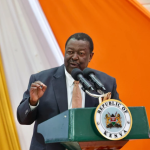The United States announced on Tuesday that it has invited the warring factions in Sudan to participate in ceasefire talks in Switzerland next month. Secretary of State Antony Blinken revealed that the U.S. has extended invitations to Sudan’s army and the paramilitary Rapid Support Forces (RSF) to begin negotiations, starting on August 14.
Blinken stated, “The United States remains committed to working with partners to end this devastating war.”
The RSF commander, who has been in conflict with the army for over a year, responded positively to Blinken’s invitation. Mohamed Hamdan Daglo announced on social media platform X that his group would participate in the talks: “I declare our participation in the upcoming ceasefire talks on August 14, 2024, in Switzerland.”
Previous attempts to negotiate peace in Jeddah, Saudi Arabia, have failed to stop the fighting, which has displaced millions, triggered warnings of famine, and left large parts of Khartoum in ruins.
Mediation efforts by the African Union and others have also been unsuccessful in bringing the opposing sides together, as both factions continue to seek tactical advantages on the ground.
The conflict, which has been ongoing for more than a year, pits the regular military led by army chief Abdel Fattah al-Burhan against the RSF, commanded by Daglo, his former deputy. The fighting has caused tens of thousands of deaths and displaced over 10 million people, including two million who have sought refuge in other countries, according to the United Nations.
Blinken explained that the purpose of the Swiss talks is to achieve a nationwide ceasefire, facilitate humanitarian access to those in need, and establish a strong monitoring and verification mechanism to ensure any agreement is implemented.
The U.S.-mediated discussions will be co-hosted by Saudi Arabia and include the African Union, Egypt, the United Arab Emirates, and the United Nations as observers, according to the State Department.
State Department spokesman Matthew Miller told reporters that “there is no military solution to the conflict in Sudan.” He emphasized that convening these national ceasefire talks and securing backing from key international stakeholders is the only viable path to ending the conflict.
When asked about the likelihood of success for the talks, Miller admitted, “We just want to get the parties back to the table,” describing it as “the best shot we have right now at achieving a nationwide cessation of violence.”
Both factions have been accused of war crimes, including deliberately targeting civilians, indiscriminate shelling of residential areas, and obstructing humanitarian aid. The ongoing conflict has led many humanitarian organizations to halt their operations in the country.
A recent UN-backed report indicated that nearly 26 million people, or just over half of the population, are experiencing severe food insecurity.
Indirect discussions between the RSF and the Sudanese military, facilitated this month in Geneva by UN Secretary-General Antonio Guterres’s personal envoy for Sudan, Ramtane Lamamra, were described by the UN as an “encouraging” initial step. These talks focused on humanitarian aid and civilian protection, though the parties did not meet face-to-face.



